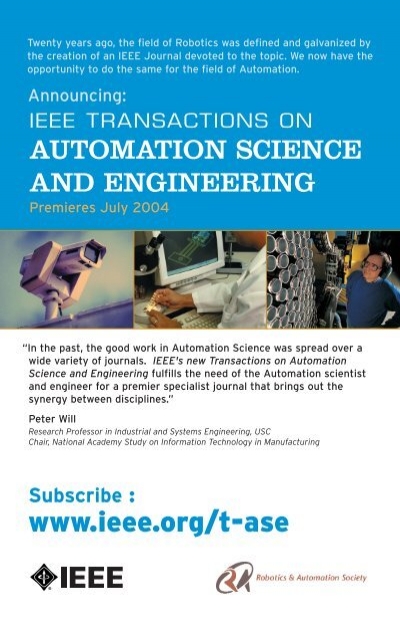有限视界时间逻辑任务下多智能体系统的分布式和反应性控制器综合
IF 6.4
2区 计算机科学
Q1 AUTOMATION & CONTROL SYSTEMS
IEEE Transactions on Automation Science and Engineering
Pub Date : 2025-03-21
DOI:10.1109/TASE.2025.3553498
引用次数: 0
摘要
满足复杂任务要求的多智能体系统局部控制器的自动合成已经引起了广泛的关注。然而,如何正式保证它们的组合行为满足指定的全局任务还不清楚。在本文中,我们的目标是综合一种自动化和分布式控制策略,用于指定为线性时间逻辑公式的队列任务,使代理异步行动,并通过局部协调仅在共享动作上同步。该方法包括三个主要步骤。首先,通过并行组合计算满足全局控制策略集;在这些策略中,评估了可分解性的条件,在此基础上找到了最大同步方案上的全局策略。然后进一步细化同步方案,得到更有效的局部控制策略。正式证明了所得到的全局行为和同步方案满足指定的全局任务。此外,在在线执行期间,合成的本地控制器可以对工作空间或队列中的更改做出反应,而无需重新规划。因此,代理之间的协作关系是根据需要自适应的。针对非平凡场景进行了数值模拟和硬件实验。从业人员注意事项-本文的动机是在协作搜索和交付过程中协调一组自主机器人的问题,其中为每个机器人合成局部控制器,以满足指定的全局任务规范。现有的解决此类问题的方法往往依赖于全连接的通信拓扑和机器人之间固定的协作关系,从而限制了多机器人执行的效率,并产生了协调困难。此外,除非执行任务重新规划,否则大多数现有方法不能直接处理任务执行期间工作空间或舰队中的更改,这将导致系统范围内通信和任务完成的时间更长,从而导致在线执行期间的失败。在本文中,我们提出了一种新的分布式控制体系结构来解决这些问题,其中机器人被控制为异步操作,并通过同步协作动作实现在线本地协调。此外,与常用解决方案相比,机器人之间的协作关系可以根据需要动态形成和移除,并且机器人对任务执行过程中的不确定性具有鲁棒性。正式证明了该同步方案所得到的机器人车队全局行为与指定的全局任务是一致的。我们已经证明,它对于复杂和耦合的多机器人应用特别有用,其中机器人之间的协作是可行的和局部的。实验结果表明,该方法适用于多机器人系统,大大提高了任务执行的并发性和效率。在未来的研究中,我们将从分散的任务分解方法中汲取灵感,以减轻随着机器人数量增加而带来的计算负担。本文章由计算机程序翻译,如有差异,请以英文原文为准。
Distributed and Reactive Controller Synthesis for Multi-Agent Systems Under Finite Horizon Temporal Logic Tasks
Automated synthesis of local controllers for multi-agent systems to satisfy complex task specifications has attracted extensive attention. However, it remains unclear how to formally guarantee that their composed behavior satisfies the specified global task. In this paper, we aim to synthesize an automated and distributed control strategy for fleet-wise tasks specified as linear temporal logic formulas, such that the agents act asynchronously and synchronize only on shared actions via local coordination. The proposed method consists of three main steps. First, the set of satisfying global control strategies is computed via parallel composition. Among these strategies the conditions for decomposability are evaluated, based on which the global strategy over a maximum synchronization scheme is found. Then the synchronization scheme is further refined to obtain more efficient local control strategies. It is formally proven that the resulting global behavior along with the synchronization scheme satisfies the specified global task. Also, the synthesized local controllers are reactive to changes in the workspace or in the fleet during online execution, without the need for replanning. Thus, collaborative relations among the agents are adaptive as needed. Numerical simulations and hardware experiments are conducted for nontrivial scenarios. Note to Practitioners—This paper was motivated by the problem of coordinating a fleet of autonomous robots in collaborative search and delivery processes, where local controllers are synthesized for each robot such that the specified global task specification is satisfied. Existing approaches to address such problems often rely on a fully-connected communication topology and fixed collaborative relations among the robots, thus limiting efficiency of the multi-robot execution and yielding difficulty of coordination. Also, most of existing approaches cannot directly deal with the changes in the workspace or in the fleet during task execution unless a task replanning is performed, which leads to longer time of system-wide communication and task completion, yielding failures during online execution. In this paper, we propose a novel distributed control architecture to tackle these issues, where the robots are controlled to operate asynchronously and achieve online local coordination by synchronization on collaborative actions. Moreover, compared with the common solutions, the collaborative relations among the robots are formed and removed dynamically as needed and the robots are robust to uncertainty during task execution. It is formally proven that the resulted global behavior of the robot fleet along with the synchronization scheme is consistent with the specified global task. We have shown that it is particularly useful for complex and coupled multi-robot applications, where the inter-robot collaborations are feasible and local. Experimental results suggest that this approach is applicable to multi-robot systems which greatly improves the concurrency and efficiency of task execution. In the future research, we will draw inspiration from decentralized approaches for task decomposition to alleviate the computational burden as the number of robots increases.
求助全文
通过发布文献求助,成功后即可免费获取论文全文。
去求助
来源期刊

IEEE Transactions on Automation Science and Engineering
工程技术-自动化与控制系统
CiteScore
12.50
自引率
14.30%
发文量
404
审稿时长
3.0 months
期刊介绍:
The IEEE Transactions on Automation Science and Engineering (T-ASE) publishes fundamental papers on Automation, emphasizing scientific results that advance efficiency, quality, productivity, and reliability. T-ASE encourages interdisciplinary approaches from computer science, control systems, electrical engineering, mathematics, mechanical engineering, operations research, and other fields. T-ASE welcomes results relevant to industries such as agriculture, biotechnology, healthcare, home automation, maintenance, manufacturing, pharmaceuticals, retail, security, service, supply chains, and transportation. T-ASE addresses a research community willing to integrate knowledge across disciplines and industries. For this purpose, each paper includes a Note to Practitioners that summarizes how its results can be applied or how they might be extended to apply in practice.
 求助内容:
求助内容: 应助结果提醒方式:
应助结果提醒方式:


